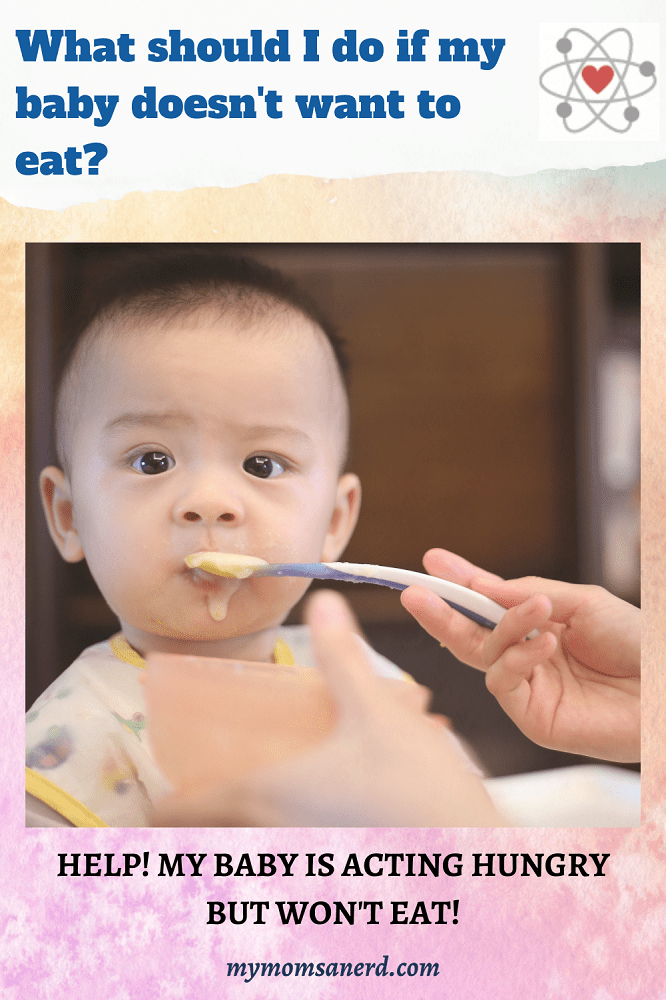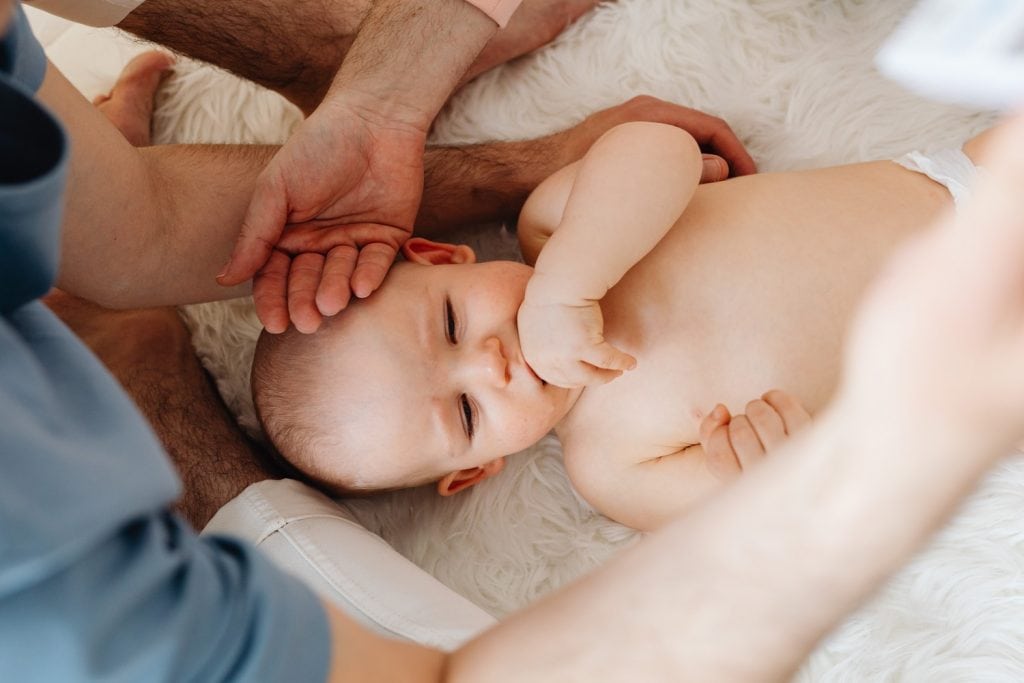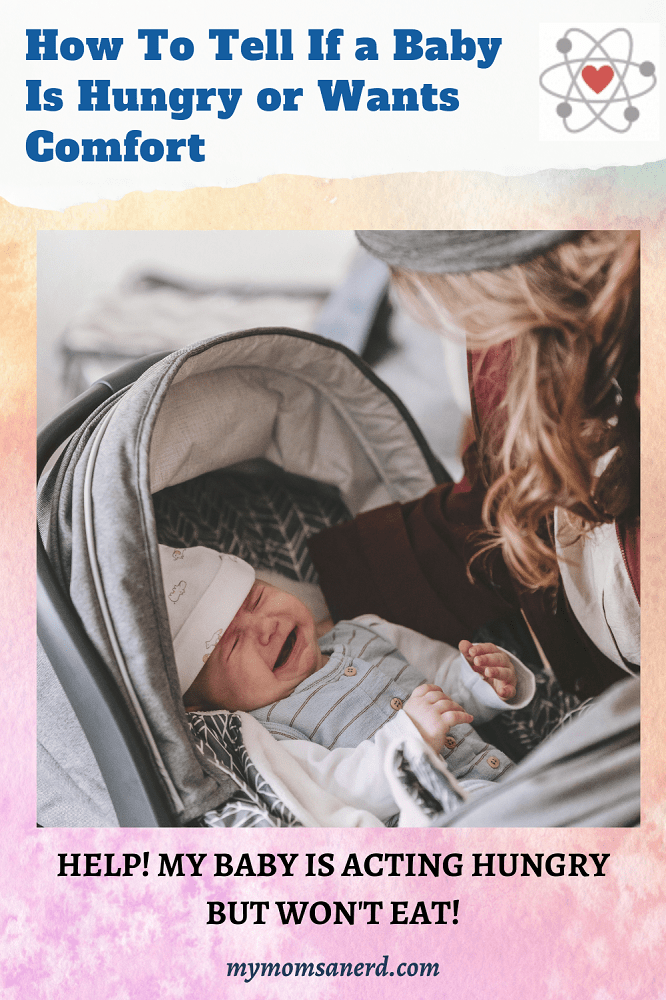Help! My baby is acting hungry but won’t eat!
Every phase of parenthood presents new challenges, whether your first baby or your fifth. Each baby comes with a different personality, different cues, wants, and needs, so it takes time to get to know your baby and what they are trying to communicate with you.
Whether you are breastfeeding, bottle feeding, or some combination of both, there may be moments in your child’s young life where they seem to be telling you that they’re hungry. However, when you present them with the bottle or your breast, they refuse to eat or cry when they do.
It can be frustrating and downright annoying when your baby acts hungry but won’t eat. They obviously can’t talk yet, so it’s normal to feel stressed and overwhelmed by a fussy baby who won’t.
What should I do if my baby doesn’t want to eat?

There are a few steps you can take to determine what’s going on with your little one if they won’t eat.
Rule out other issues
If your baby seems to have issues swallowing or arching his back during feedings, he may be experiencing acid reflux, which can be very uncomfortable. GERD may be the problem if they make choking or gagging sounds while eating or are often regurgitating after they eat.
You can also track how often he is pooping to ensure he isn’t constipated. A constipated baby will show signs of hunger but won’t want to eat or will cry when he is fed.
Try snuggling
If your baby is fussy but won’t settle down to eat, try getting them in a quiet room to calm down and relax. Rock them, sing to them, and make them feel safe and secure. Sometimes, babies just need a good cuddle and don’t quite know how to communicate that yet.
Call the doctor
When all else fails, call the pediatrician. Your doctor may be able to refer you to a feeding specialist or make recommendations so you can find success with feeding your baby. Don’t hesitate to reach out to your baby’s doctor — that’s what they are there for.
Why does my baby keep acting hungry?

The signs of a hungry baby, including newborns and those under the age of one, generally include:
- Putting their hands in their mouths
- Rooting for Mom’s breast or whoever may be holding them
- Turning toward the bottle or looking at it
- Clenching their fists
- Being grumpy, fussy, or inconsolable
Older babies and toddlers usually show signs of hunger by pointing or reaching for food, getting excited when they see food, and making noises to let you know they are hungry and ready to eat.
Cluster feeding is very common in babies before their first birthday. As your baby goes through developmental leaps and growth spurts, he or she will likely be fussier, hungrier, and more tired throughout the day.
The leaps your baby experiences are uncomfortable, and they want to be snuggled and loved on more than usual. You can offer your baby the breast or bottle throughout the day during a leap or growth spurt, but he may just want to be held.
My baby acts hungry but cries when eating
If your baby is acting hungry by making sucking noises or smacking his lips, he may just be trying to self-soothe. Sucking is a way that your baby relaxes and even sleeps better.
Making sucking or puckering noises with their mouths can indicate they are tired and ready to sleep, especially if they are crying or fussy when you try to feed them.
If that’s the case, it may be time to try a pacifier and see how he or she takes it. Pacifiers help babies learn to self-soothe and can help satisfy their sucking reflex. You may find your baby sleeps much better when you put him down with a pacifier. It’s worth a shot! This is one of the best newborn pacifiers that parents swear by.
Some babies struggle with gastroesophageal reflux disease (GERD), and they may be crying or sucking to get the acid back into their tummies. A pacifier can also help with reflux.
How to tell if a baby is hungry or wants comfort

If your baby is eating solids, try feeding him something that you know he likes and typically has no issue eating. If he doesn’t want solids, try to nurse him or give him a bottle.
If both forms of feeding upset him and he becomes more agitated or fussy, your baby is probably overtired and is struggling to calm himself down. If feeding doesn’t work, it’s now a process of trial and error.
If your baby is young enough to be swaddled, prepare him for bedtime or a nap. Turn the lights down, give him the pacifier, and get the sound machine going. Cuddle with him in the rocking chair in the nursery, sing quietly, and even try a baby massage to keep him calm.
If your baby is tired or wants comfort, he will probably calm down in the relaxed environment and fall asleep. If he is hungry, he won’t give up easily and will wake up quickly, even if he does fall asleep initially.
You might also find this post helpful: FAQs About High Chair for Baby!
Wrap Up – My Baby Is Acting Hungry But Won’t Eat

Feeding is just one more challenge parents and babies face together. From breastfeeding and bottle feeding to introducing solids, baby-led weaning, and picky eaters, there’s no doubt that feeding can be a stressful situation for everyone involved.
Pay attention to your baby’s hunger cues and how they contrast with other behavioral cues expressed when they are tired, grumpy, and wanting comfort. This can help you determine what’s going on and what your next move should be.
Related Posts:
- What to do when Baby Won’t Sleep For Mom But Will For Dad
- Baby Won’t Sleep In Our New House
- Tips on handling a Toddler Kicking During Diaper Change

